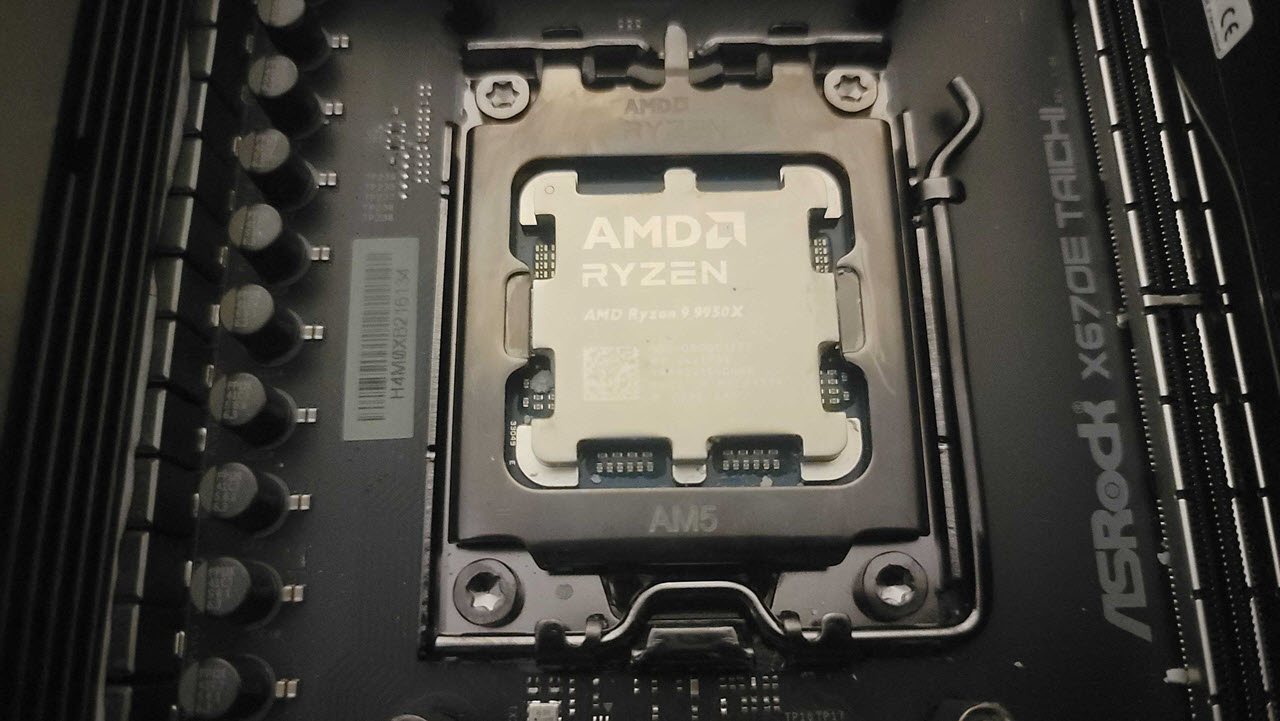Why you can trust Tom's Hardware
The $650 Ryzen 9 9950X delivers generational increases in gaming and productivity workloads, but competitive price pressure from both Intel and AMD's own processor lineups could make it a tough sell outside of very specific use cases.
First, though, AMD needs to fix its drivers. The situation with the chipset drivers making irreversible changes to the operating system is nonsensical and problematic for end users and reviewers alike. AMD has known about this issue for 16 months, and despite endless public complaints from end users and the press, it hasn't been addressed. We've been told multiple times that Microsoft is responsible for delivering a fix (which obviously hasn't happened), but that explanation doesn't hold water: This is AMD's product, and therefore, it is AMD's responsibility to ensure that a fix is implemented.
Below, we have the geometric mean of our gaming test suite at 1080p and 1440p and a cumulative measure of performance in single- and multi-threaded applications. We conducted our gaming tests with an Nvidia RTX 4090, so performance deltas will shrink with lesser cards and higher resolution and fidelity settings.
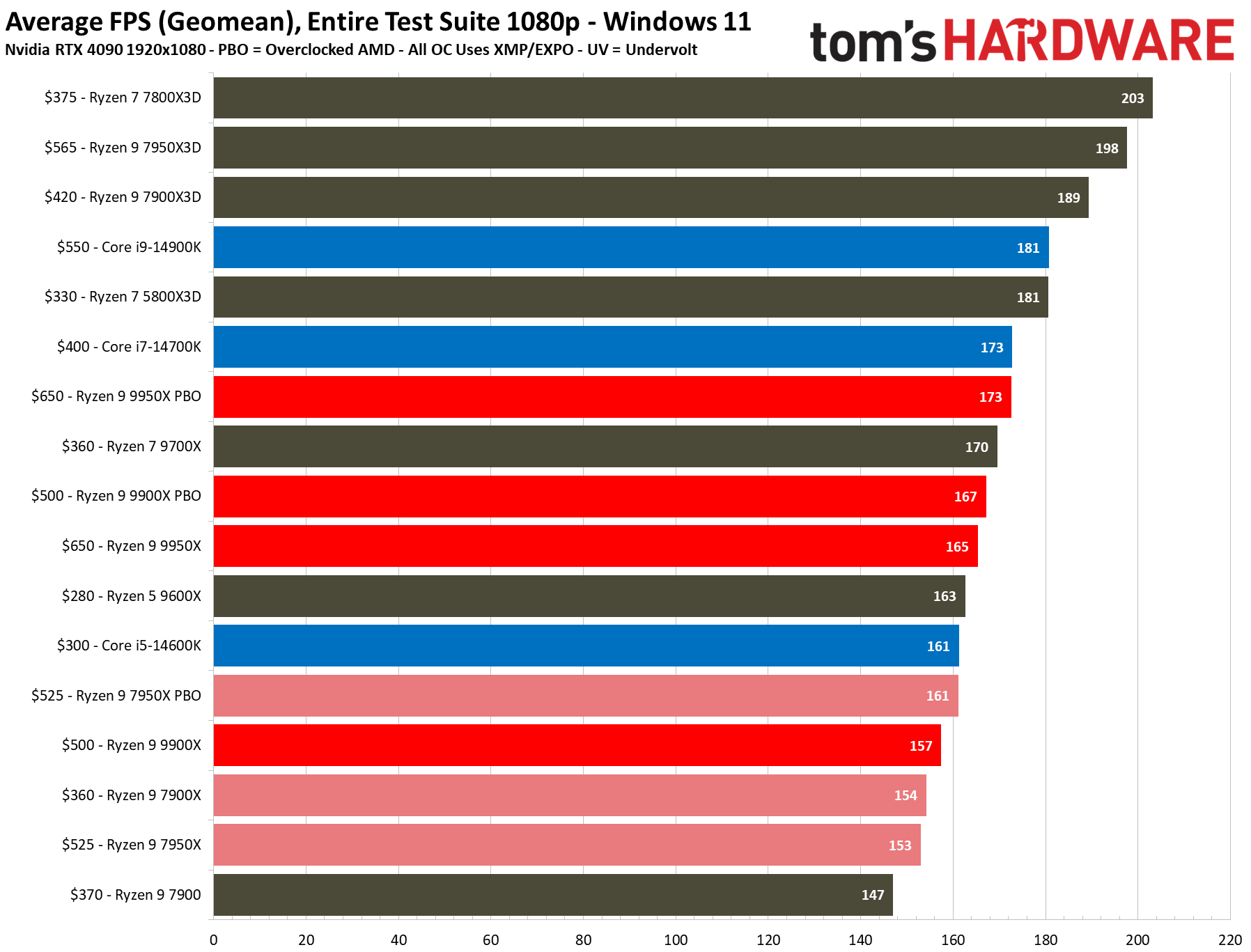
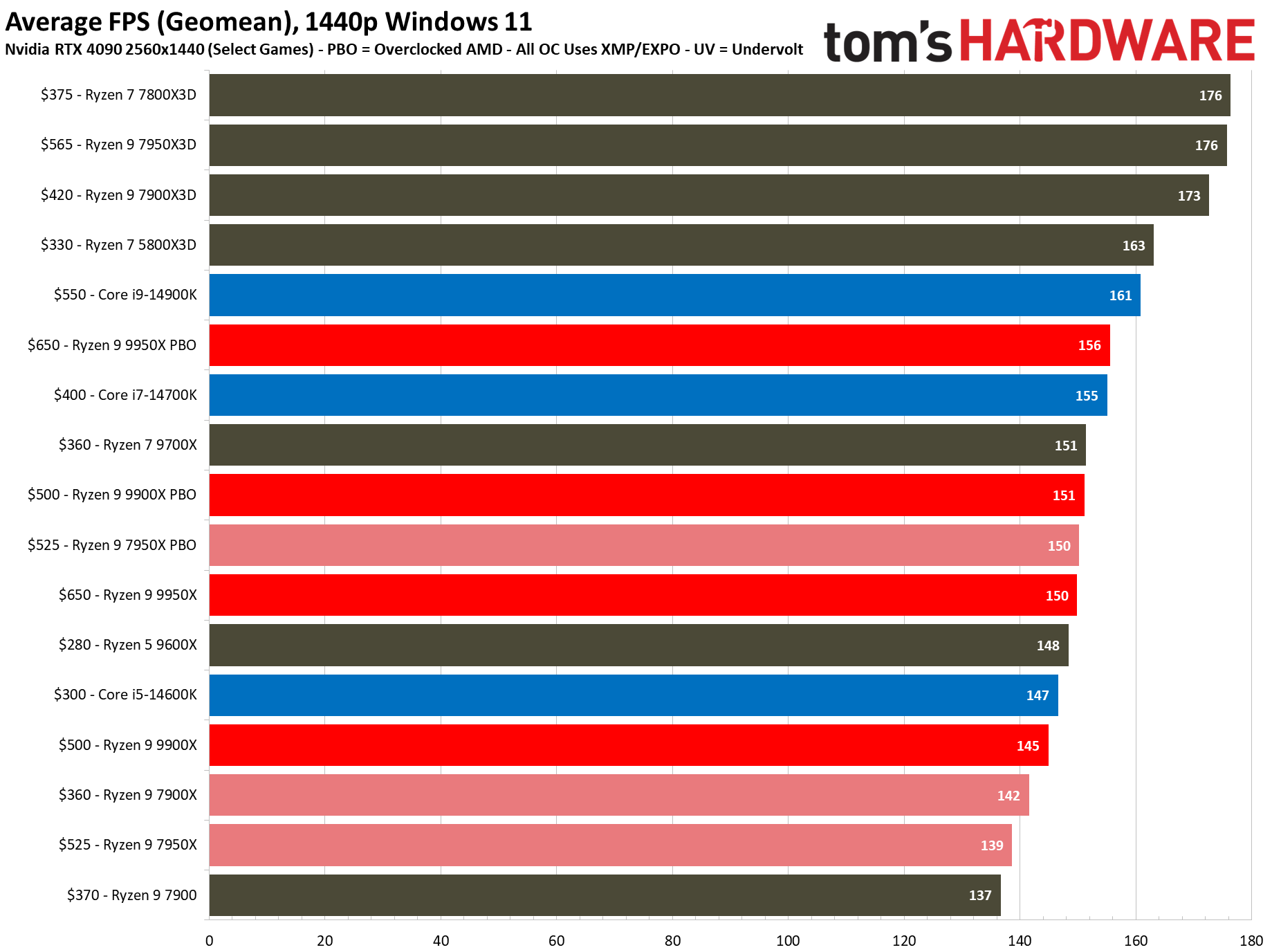
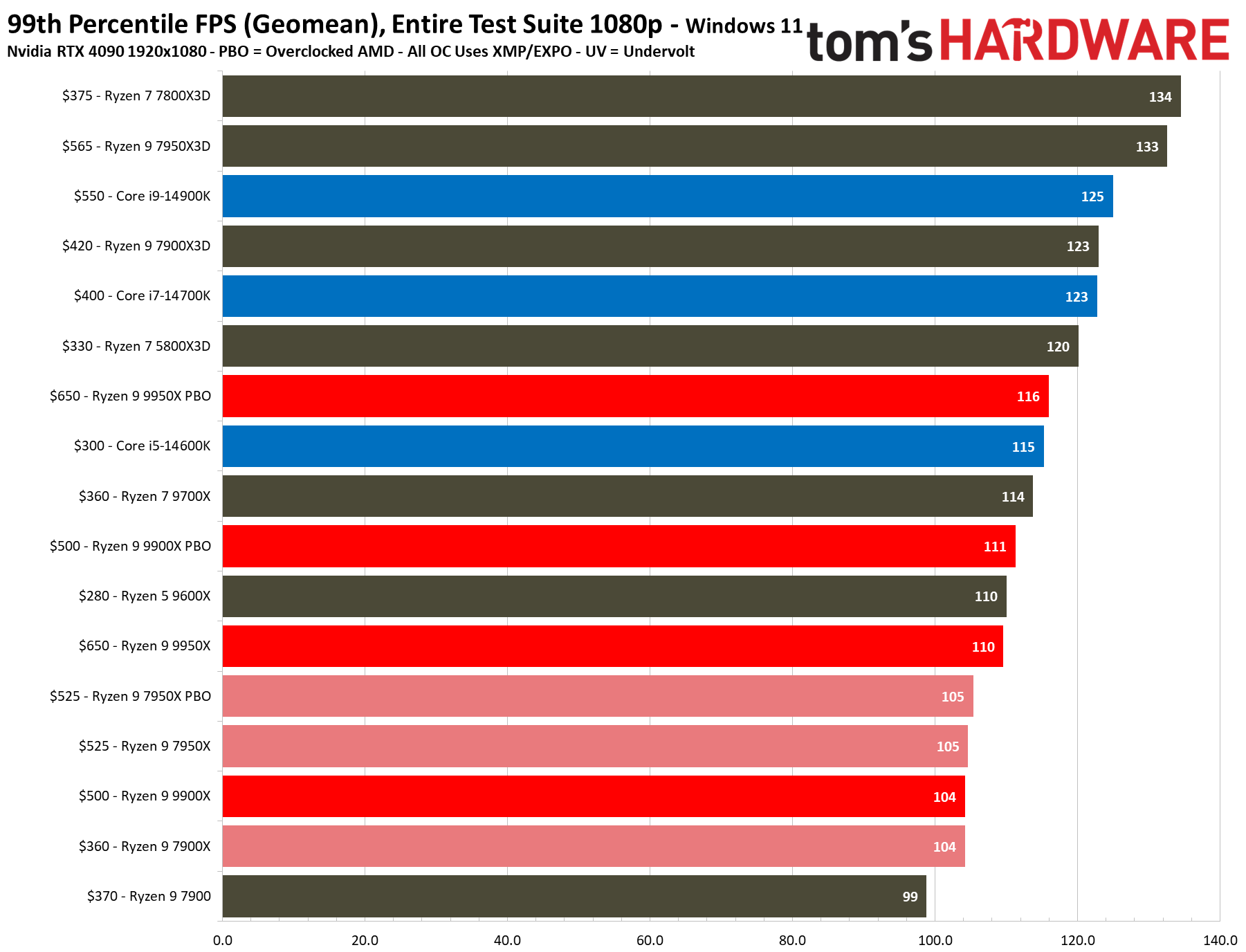
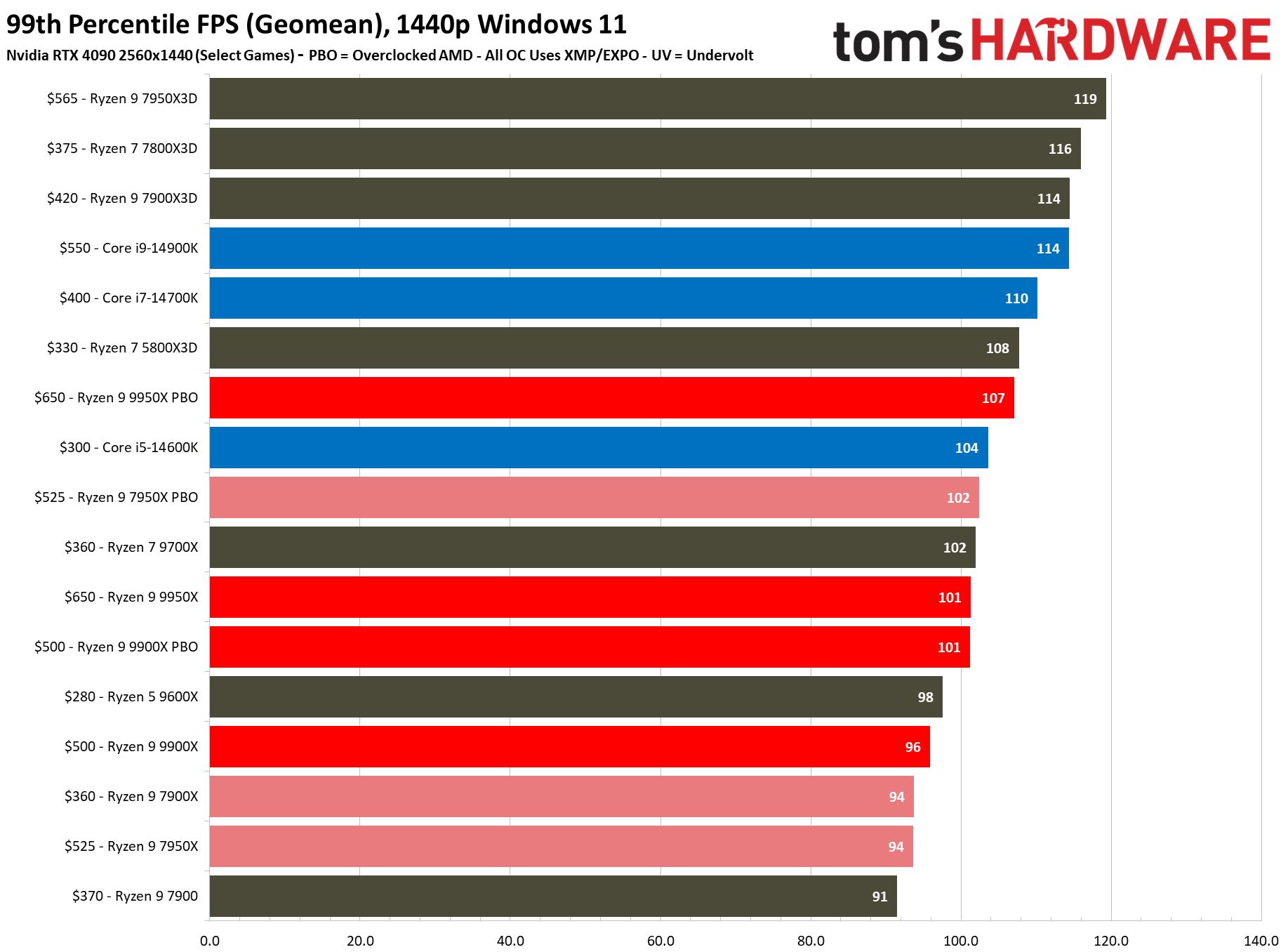
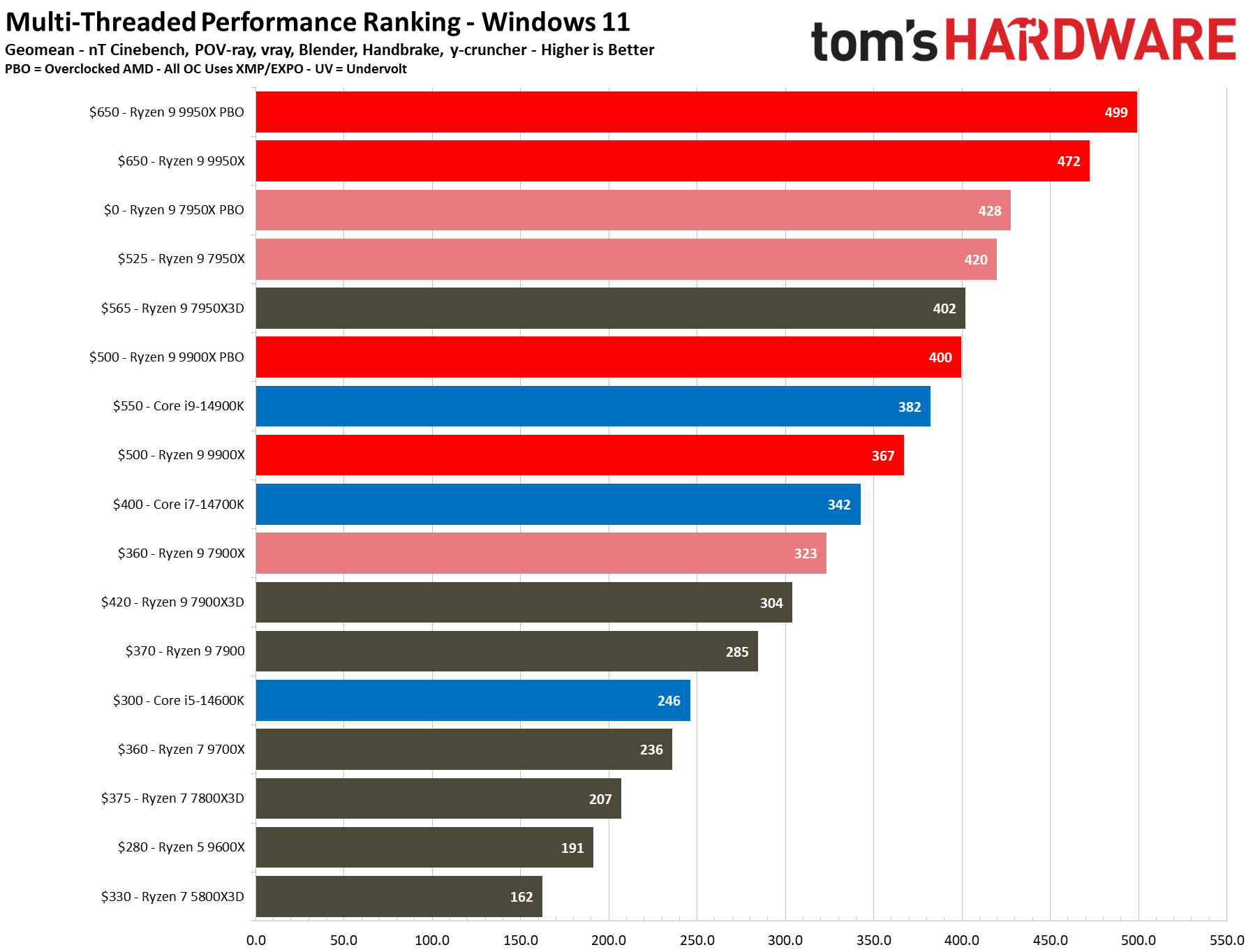
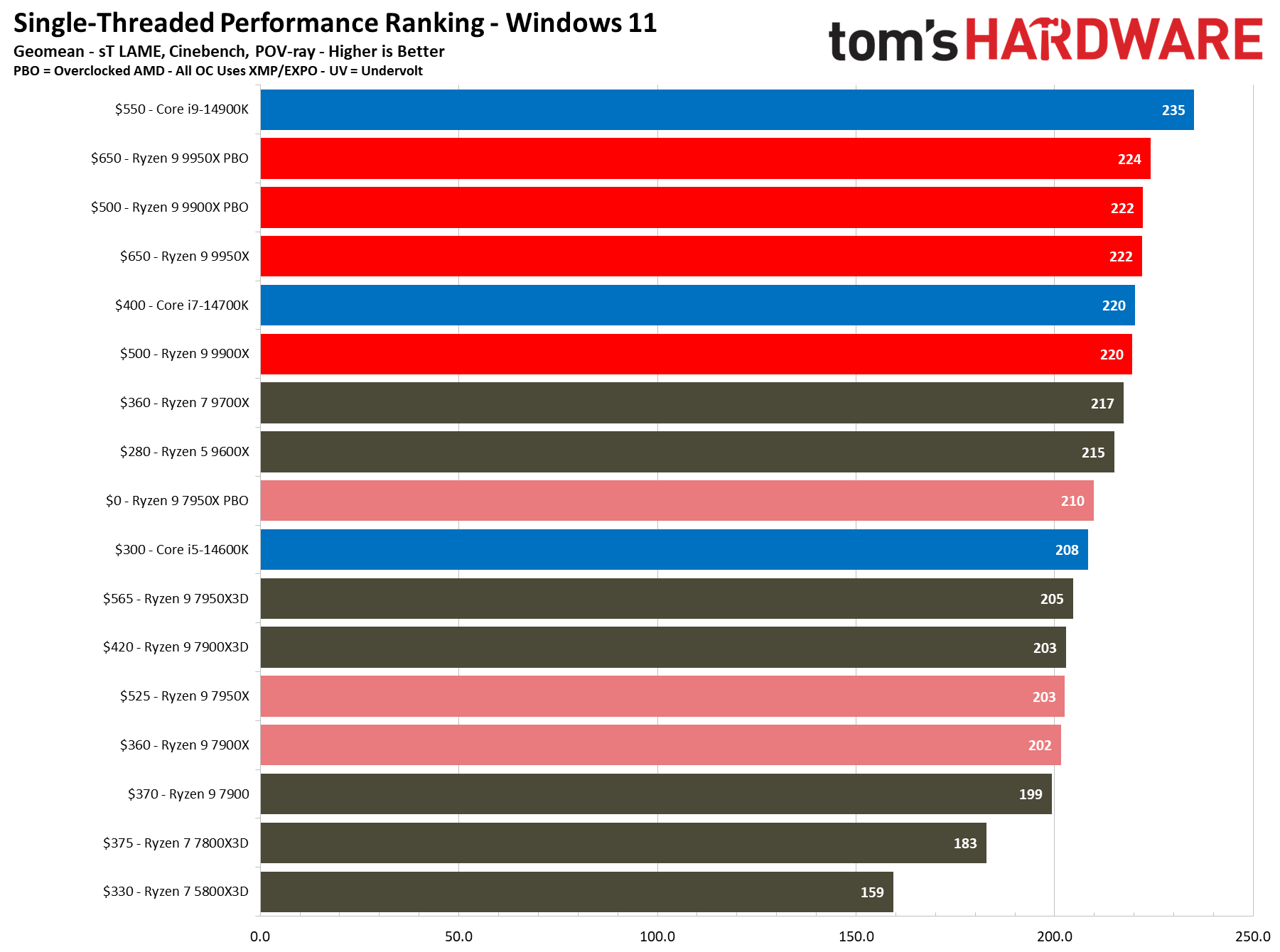
In our cumulative measure of 1080p gaming performance, the Ryzen 9 9950X was roughly 8% faster than the prior-gen Ryzen 9 7950X, but it couldn't unseat the competing Intel Core processors that retail for far less. At stock settings, the $550 Core i9-14900K is 10% faster in 1080p than the Ryzen 9 9950X, while the $400 Core i7-14700K is 5% faster. For those seeking leading-edge performance in gaming and willing to accept tradeoffs in productivity work, AMD's own Ryzen 7000X3D processors remain the go-to chips, while those on a more restrictive budget can find great performance in the company's Zen 3-based 5000X3D processors.
The Ryzen 9 9950X also delivers generational gains in productivity applications and takes the overall lead in multi-threaded workloads. But those gains can be slim over the company's prior-gen Ryzen 9 7950X, which currently retails for $125 less. The Ryzen 9 9950X was 12% faster than the 7950X in our overall measure of multi-threaded performance and 9% faster in single-threaded work. However, the generational uplift varies by workload, with some heavily-threaded applications showing less of an improvement over the 7950X. In the end, we're looking at a 23% premium for the 9950X over the 7950X for low double-digit gains in performance, and we expect that pricing for the 7950X will decrease further in the future.
The Ryzen 9 9950X is more impressive against the Core i9-14900K in our multi-threaded benchmarks, delivering a 23% gain in our overall measure. However, that shrinks to 13% if we remove the heavy AVX-512 y-cruncher benchmark. The Core i9-14900K retains a 6% lead in single-threaded performance and enjoys a significant lead in gaming performance, leaving it room to slot in as a more balanced and affordable alternative, albeit one that potentially draws more power.
The Ryzen 9 9950X is the lone Zen 5 chip for desktop PCs with the same TDP rating as its prior-gen counterpart. The 9950X consumed between 7–15 percent less power than the 7950X in a range of workloads, but that isn't a huge generational improvement. The Ryzen 9 9950X is much more power efficient than the competing Core i9-14900K, but both chips require high-end motherboards and coolers to extract the utmost performance.
We'll post a separate review of the Ryzen 9 9900X in the coming days, but our general impression is that this chip is a disappointment in gaming and doesn't deliver enough performance in productivity applications to justify the price tag.
The Ryzen 9 9950X does take the overall lead in heavily threaded performance on a mainstream PC platform, but be aware that Intel also has its Arrow Lake processors coming in the near future, so it might be best to wait and see what that series has to offer.
For now, if you want more threaded performance than the 9950X, you'll have to step up to workstation-class platforms, like AMD's Threadripper Pro and Intel's Xeon W, but those carry eye-watering premiums. That could make the Ryzen 9 9950X worth the premium for those solely interested in performance in heavy productivity workloads.
However, most users focused on productivity work would be better served by a reduced-cost Ryzen 9 7950X — this chip will surely see further price reductions in the near future — or an Intel alternative, if the price is right. The Ryzen 9 9950X also doesn't make a compelling choice for gaming — AMD's own X3D processors remain the chips to beat.
- MORE: AMD vs Intel
- MORE: Zen 4 Ryzen 7000 All We Know
- MORE: Raptor Lake All We Know
Get Tom's Hardware's best news and in-depth reviews, straight to your inbox.
Current page: Zen 5 at Full Power
Prev Page AMD Ryzen 9 9950X Power Consumption, Overclocking, Test Setup, Thermals
Paul Alcorn is the Editor-in-Chief for Tom's Hardware US. He also writes news and reviews on CPUs, storage, and enterprise hardware.
-
HideOut Your story mentioned the USB 4.0 60GB/s with 3rd party chips, is that a new feature? its 40GB/s and then the newest standard of Thunderbolt is 80/80 (or 120 if you change one of the channels to make it asymetrical). There is no such thing as 60Reply
And pretty much like every other enthusiest on here, I think th is is the most disapointing AMD launch...ever -
Paul Alcorn Reply
Good eye. Typo, fixed!HideOut said:Your story mentioned the USB 4.0 60GB/s with 3rd party chips, is that a new feature? its 40GB/s and then the newest standard of Thunderbolt is 80/80 (or 120 if you change one of the channels to make it asymetrical). There is no such thing as 60
And pretty much like every other enthusiest on here, I think th is is the most disapointing AMD launch...ever -
btmedic04 While this isn't like 6 generations of skylake, it sure feels a bit like it. This is why we need a competitive product from both companies in both performance and powerReply -
Gururu It gets so confusing when the performance of new products falls between products from the past generation. Just make one chip with a true generational difference and charge $600.Reply -
NinoPino Very disappointing the single thread and gaming results. Anyway I find suspicious results on some benchmarks.Reply
There are regressions respect 7950X in games like "Far Cry 6" and "Hitman 3".
Regression also in Outlook score vs 7950X.
I found abnormal also the NAMD score that for the 9950X is 0.6328 days/ns while Phoronix achieved a 3.14 ns/day that is about twice the performance, for comparision the 14900k is in line with Phoronix.
I suspect there is something to analyse and refine on these benchmarks.
Agree that the driver problem with core parking feature is something unacceptable. But the need to reinstall the OS seems to me something exaggerated, must exist a better solution.
Also is historical the surpass in Adobe benchmarks.
Thanks for the review. -
redgarl There is obviously something fishy with Windows when you look at the results on Linux.Reply
"The Ryzen 9 9950X was 33% faster than the Intel Core i9 14900K performance overall and even the Ryzen 9 9900X was 18% faster than the Core i9 14900K. For those still on AM4, the Ryzen 9 9950X was delivering 1.87x the performance of the Ryzen 9 5950X processor. These are some great gains found with the Ryzen 9 9900 series."
-Phoronix
-
jeremyj_83 Anyone know if Zen 5 will allow for a mclk/uclk 1:1 with DDR5-6400 RAM or will that max out at 6000 again?Reply -
Blastomonas Whilst it maybe disappointing for some, it simply appears that AMD are continuing to separate out their gaming CPU range from their productivity range.Reply
This appears to be a very powerful and efficient chip for multi core workloads that will likely get better when some of the usual teething problems are ironed out.
Nothing groundbreaking, just a bit better.
